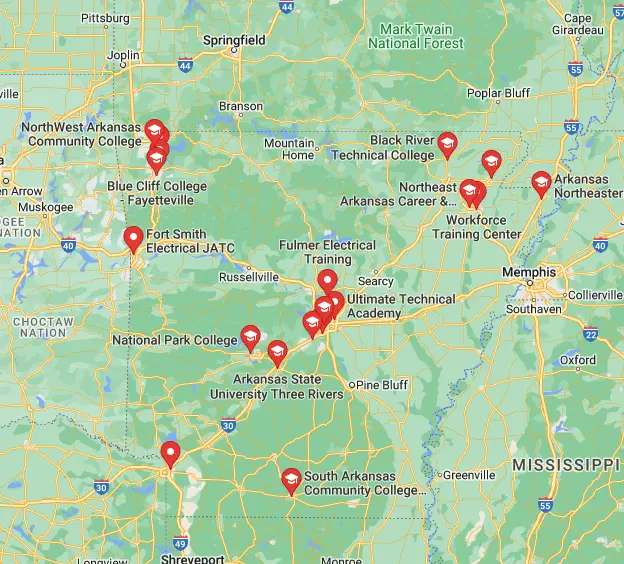If you’re looking for electrician schools in Arkansas, check out this list of schools and courses to help you in your career as an electrician.
Ultimate Technical Academy
Electricians Service & Maintenance Course
This one-week course contains a blend of classroom training that teaches the theory on “how it works” and most importantly the “hands-on training” in the lab teaches the “how-to” procedures that get the job done.
UTA maintains a low student-to-instructor ratio so each technician gets the “one on one” help they need in the lab. Each student works individually in the lab to excel at their own rate. We provide all tools, meters, and diagnostic equipment necessary during the course.
Topics covered:
- Electrical theory, safety, transformers, inductive & resistive loads.

- Electrical Troubleshooting and reading diagrams.
- Low voltage relays and controls.
- Motor theory, application, and starting controls.
- Time-saving diagnostic methods that help get right to the problem.
- Code requirements for residential wiring.
- Panel replacements.
- Understanding and building a residential home wiring system.
- Main Panel wiring and construction.
- Branch circuit design and wire sizing.
- Grounding and neutral.
- Circuit is most used in residential wiring.
Students will spend two-thirds of the time in the lab wiring and troubleshooting the most popular electrical circuits used in residential wiring.
Newer Apprentice Electricians will learn the electrical skills needed to install and troubleshoot the majority of the circuits used in residential home wiring. They will be able to perform light service diagnostics now and have a foundation to build their career on. With the ability to perform most of the wiring and maintenance tasks involved in residential wiring, they will be more productive as they work through their apprenticeship program.
Technicians who have a Year or Two of Experience will improve their diagnostic skills to quickly and accurately troubleshoot electrical problems. This gives technicians the ability to take on more difficult calls and allows them to excel in their careers. Students not only gain the technical knowledge they must have, but also the confidence they need to succeed.
Arkansas College of Electricity
Arkansas College of Electricity was founded in 1994. Providing a 4-year program, Spanish assistance class offered hands-on Motor Controls, a Computer lab for exam preparations, and Continuing Education credits.
During the program, the apprentice receives both structured, on-the-job training (OJT) and classroom instruction. For each year of the apprenticeship, the apprentice will receive 2,000 hours of on-the-job training and 144 hours of classroom instruction.
Arkansas Construction Education Foundation
The Electrician is involved in the installation, commissioning, testing, and maintenance of various wiring systems. Electricians render services in residential, commercial, and industrial settings.
Apprentices entering the electrical trade are required to be licensed by the Arkansas Department of Labor, Board of Electrical Examiners. This is a four-year program consisting of 640 hours of classroom instruction and 8,000 hours of on-the-job training. You will attend class one night a week at ACEF and work full-time with an electrical employer. When a student completes the program, he or she will be granted a “release to test,” and can submit an application to sit for the journeyman electrician’s exam.
IBEW 700
IBEW offers union based electrician apprenticeship training programs
NWACC
WACC’s electrical apprenticeship program provides a hands-on educational experience by combining classroom instruction and on-the-job training.
To participate in the electrical apprenticeship program, you will first need to be 18 years of age, employed with an electrical contractor in the state of Arkansas.
Upon registering for this program, you will gain an apprenticeship license issued by the state of Arkansas.
NWACC’s electrical apprenticeship program lasts four years, or 576 hours of related technical instruction (RTI) and 8,000 hours of on-the-job (OJT) training. Classes begin in July and are in session through April.
Upon completion of the 576 contact hours and 8,000 hours of on-the-job training, you will be eligible to take the Journeyman Electrician Exam, administered by the state of Arkansas.
Arkansas State University Newport
The High Voltage Lineman Technology program prepares individuals to apply the technical knowledge and skills needed to install, repair, service, and maintain electrical power lines and supporting equipment.
The program includes instruction in AC/DC electrical theory, safety, transformers, tools, material, testing equipment, pole framing, and bucket and digger derrick trucks. The program also includes instruction in the construction, maintenance, and troubleshooting of underground electrical systems.
Students also receive instruction in pole climbing, pole testing, equipment maintenance, and pole top rescue. Graduates may find employment in the field of electrical power line work for companies like Electric Cooperatives of Arkansas, Entergy Arkansas, Southern Electric Contractors in Mississippi, Bird Electric Co. in Washington, and Patriot Solutions in South Carolina.
Arkansas Northeast College
Offers an Electrical Apprenticeship program.
Program Requirements & Information
- Applicant must be employed and supervised by a Master Electrician
- Program Duration 4 Years
- 576 Classroom Hours
- 8,000 On-the-Job-Training (OJT) Hours
- Class runs from August – May
- Paperwork must be completed
- Application + $10 Money Order
- High School Transcript/GED
- Driver’s License or Proof of ID
- Attendance is mandatory unless a written excuse from the employer is presented

